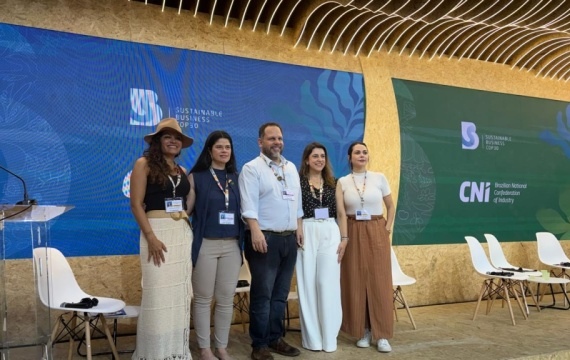Tropical Agriculture Takes Center Stage at COP30 in Panel Featuring FGV Researcher
On November 13, at the CNI stand in the Blue Zone of COP30, the panel “Tropical Agriculture: Science, Challenges and Opportunities” brought together specialists to discuss how scientific advances are transforming agricultural production in the tropics and what paths could position Brazil as a leader in the transition to sustainable food and energy systems.
Talita Pinto, coordinator of the Knowledge and Innovation Observatory in Bioeconomy (FGV Bioeconomia), emphasized that tropical agriculture was born out of the need to adapt to inhospitable soils but has evolved into a competitive and innovative model supported by science and technology. “Sustainability must be based on an economic, environmental, and social tripod,” she stated, noting that Brazilian soy already has a lower carbon footprint compared to other countries. According to her, alignment between the public sector and academia is essential to generate income and jobs in rural areas while contributing to emissions removal.
The debate also addressed the importance of scientific neutrality, grounded in robust data and replicable methodologies, and the tropicalization of science, which considers specific regulatory, social, and environmental characteristics. Another point highlighted was the need for systemic analyses that assess direct and indirect impacts on production chains, including social, economic, and environmental aspects.
The panel referenced a publication launched at COP30 by FGV Emeritus Professor and Special Envoy for Agriculture at COP30, Roberto Rodrigues: “Sustainable Tropical Agriculture: Cultivating Solutions for Food, Energy and Climate”, developed in partnership with the Instituto Pensar Agro and 54 sector entities. The document proposes guidelines to tackle challenges such as illegal deforestation and clandestine mining, while promoting international cooperation and consolidating regenerative practices.
The central message of the meeting was clear: tropical agriculture, born from science and adaptation, now represents a strategic opportunity for Brazil to lead global solutions in food, energy, and climate.
Full coverage of Fundação Getulio Vargas’ participation in COP30, including agendas, exclusive content, and contributions from the institution’s researchers to global climate action, is available on the FGV Climate Agenda Platform. The opinions expressed in this publication are the sole responsibility of the contributing researchers and do not necessarily reflect the official position of Fundação Getulio Vargas.
